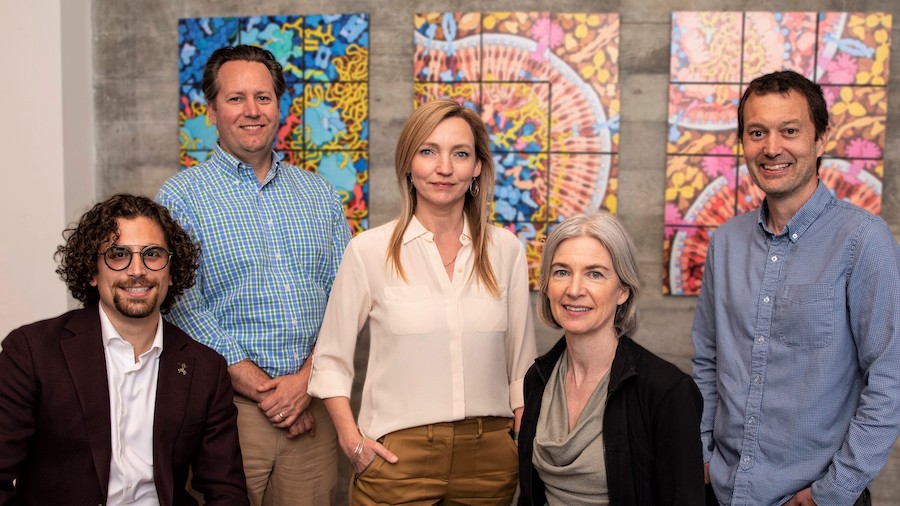Molecular engineering company Scribe Therapeutics has completed an oversubscribed $100 million round of Series B financing to further develop its “CRISPR by design” platform, as well as advance its pipeline of genetic treatments.
Subscribe to the Crunchbase Daily
Scribe was founded “on paper” in 2017 by molecular engineers Benjamin Oakes, Brett Staahl and David Savage, as well as CRISPR co-inventor Jennifer Doudna, who won the 2020 Nobel Prize in chemistry, to create advanced technologies for CRISPR-based genetic medicine.
CRISPR stands for “clustered regularly interspaced short palindromic repeats” and enables researchers to more easily identify DNA sequences and modify gene function to develop in vivo therapies that treat the underlying cause of disease, Oakes told Crunchbase News.
“I started in genome editing a decade ago, and the only way to do this was to build a library of molecules and test every one over and over again,” Oakes said. “I was spending 90 hours a week testing, so you can see immediately why CRISPR would be impactful.”
Treating disease
Avoro Ventures and an affiliated company, Avoro Capital Advisors, led the Series B financing and were joined by OrbiMed Advisors and Andreessen Horowitz. The syndicate also includes Perceptive Advisors, funds and accounts advised by T. Rowe Price Associates, and funds managed by Wellington Management, RA Capital Management and Menlo Ventures. To date, the company raised $120 million, which includes a $20 million Series A round in 2018 led by Andreessen Horowitz, according to Crunchbase data.
As part of the financing, Behzad Aghazadeh, managing partner at Avoro Ventures and Avoro Capital Advisors, and Carl L. Gordon, managing partner at OrbiMed Advisors, will join Scribe’s board of directors.
“Scribe is applying deep, multidisciplinary engineering expertise to develop the custom tools and applications needed to confront genetic diseases,” said Aghazadeh in a written statement.
Meanwhile, Vijay Pande, general partner at Andreessen Horowitz, said in a statement that Scribe’s approach has “revolutionized industry expectations for blueprinting and creating CRISPR-based therapies.”
He added: “By accelerating the shift from an artisanal discovery approach to a fully industrialized one, the company is poised to fundamentally transform how we treat and manage genetic diseases at scale.”
Use cases
Use cases for CRISPR depend on what the molecule is capable of, Oakes said. They include editing stem cells or T cells to create better stem cells, such as chimeric antigen receptor T cells, better known as CAR-Ts, for use in immunotherapy. The work can be both in vivo or ex vivo, meaning inside or outside an organism.
CRISPR technology is also being used to develop treatments for unmet diseases. In 2020, Scribe began collaborating with Biogen as part of a $400 million research project to develop CRISPR-based therapies that address the underlying causes of Amyotrophic Lateral Sclerosis (ALS).
In addition, this week, Intellia Therapeutics, a Cambridge, Massachusetts-based genome editing company focused on developing curative therapeutics using CRISPR/Cas9 technology, announced that the European Commission granted orphan drug designation for one of its candidates being developed to treat transthyretin amyloidosis. This rare condition impacts organs and tissues through the accumulation of misfolded transthyretin protein deposits. The therapy has the potential to halt and reverse the condition’s progression, the company said.
The new capital will be used to continue developing Scribe’s gene-editing system and its delivery technologies, such as how the therapies are delivered into the body to target where needed, as well as to advance a pipeline of therapeutics for neurodegeneration and other diseases.
“Engineering is a slow process, but each step gets you closer,” Oakes said. “We continue to build upon the model to make it better and better. I don’t want to treat diseases with something meant for another disease. I would like to build the right tools for the job. It allows us to truly bring all of these together to build new ways of modifying biology and applying it.”
Feature photo of Scribe’s leadership team, from left: Benjamin Oakes, Brett Staahl, Svetlana Lucas, Jennifer Doudna and David Savage. Photo courtesy of Scribe Therapeutics.
Blogroll illustration: Dom Guzman

Stay up to date with recent funding rounds, acquisitions, and more with the Crunchbase Daily.


![Illustration of a guy watering plants with a blocked hose - Global [Dom Guzman]](https://news.crunchbase.com/wp-content/uploads/quarterly-global-3-300x168.jpg)
67.1K Followers